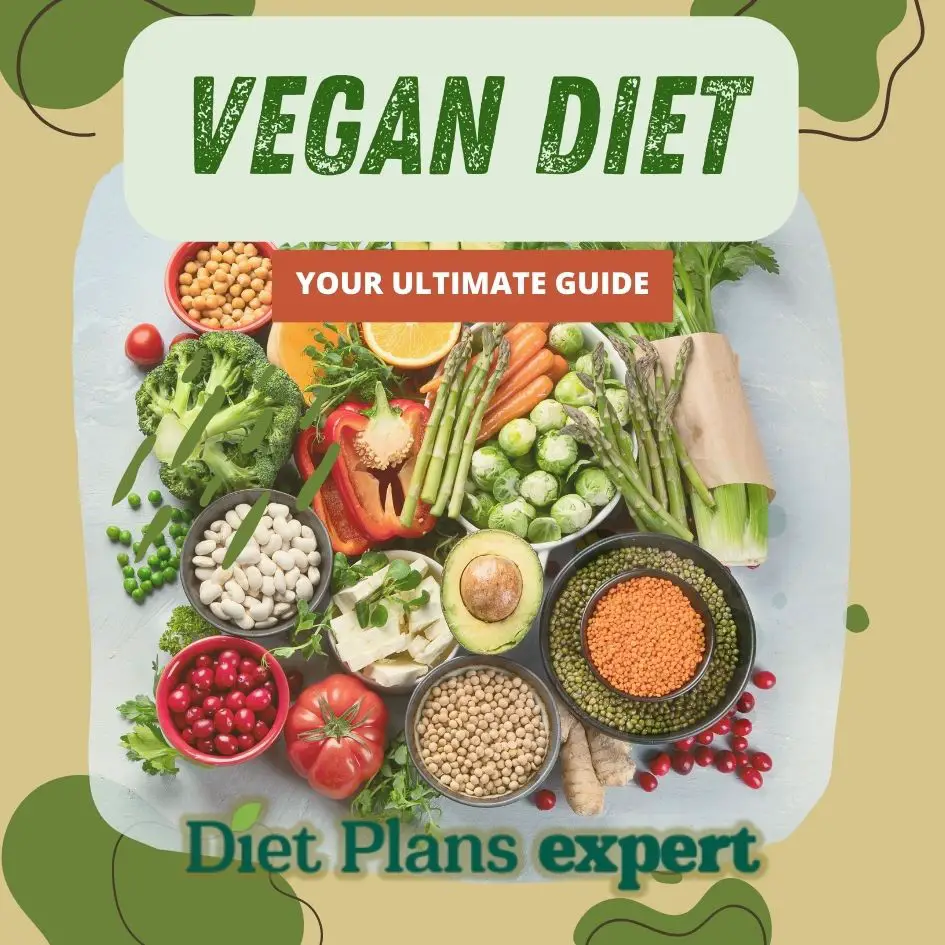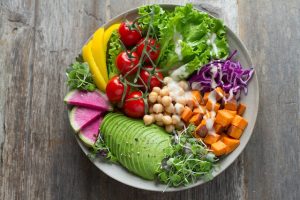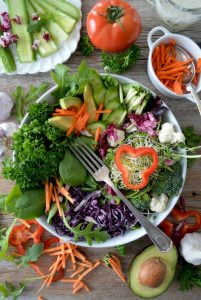Introduction
Vegan diets are becoming increasingly popular, and for good reason. They are not only good for the environment, but they can also be very healthy. In this blog post, we will discuss the basics of a healthy vegan diet, including what to eat, what to avoid, and how to make sure you are getting all of the nutrients you need.
We will also provide some tips for making the transition to a vegan diet, as well as some delicious vegan recipes to get you started. So whether you are a new vegan or just curious about the benefits of a plant-based diet, read on for all the information you need to know.
Understanding Vegan Diets
What is a Vegan Diet?
A vegan diet is a type of plant-based diet that excludes all animal products, including meat, poultry, fish, dairy products, and eggs. Vegans also avoid honey and other animal-derived products, such as gelatin and lanolin.
How Does a Vegan Diet Work?
A vegan diet works by providing the body with the nutrients it needs from plant-based foods. Plant-based foods are a good source of protein, fiber, vitamins, and minerals. They are also low in saturated fat and cholesterol.
Types of Vegan Diet
There are many different types of vegan diets, each with its own unique set of benefits and challenges. Some of the most common types of vegan diets include:
- Whole food vegan diet: This diet is based on whole, unprocessed plant foods, such as fruits, vegetables, whole grains, legumes, nuts, and seeds. It is a great way to get all the nutrients you need on a vegan diet.
- Raw vegan diet: This diet consists of only raw, unprocessed plant foods. It is a more restrictive diet than a whole food vegan diet, but it can be very beneficial for people who are looking to improve their gut health or lose weight.
- Junk-food vegan diet: This diet consists of processed vegan foods, such as vegan junk food, fast food, and frozen dinners. It is not a healthy way to follow a vegan diet, but it can be a good option for people who are just starting out and who are not ready to make major changes to their diet.
- Flexitarian diet: This diet is a mix of vegan and non-vegan foods. It is a great way to transition to a vegan diet or to make sure you are getting all the nutrients you need if you are not able to follow a strictly vegan diet.
- Interested in the flexitarian diet? Read more about it in this detailed blog post!
No matter what type of vegan diet you choose, it is important to make sure you are getting all the nutrients you need. You can do this by eating a variety of plant foods and by taking a vegan multivitamin.
Benefits of Vegan Diets
There are many potential health benefits associated with vegan diets. These benefits include:
- Reduced risk of heart disease: Vegan diets are often associated with a lower risk of heart disease. This is because they are low in saturated fat and cholesterol, which are two major risk factors for heart disease.
- Reduced risk of stroke: Vegan diets are also associated with a lower risk of stroke. This is likely due to the same factors that reduce the risk of heart disease.
- Reduced risk of type 2 diabetes: Vegan diets are also associated with a lower risk of type 2 diabetes. This is likely due to the fact that they are low in saturated fat and calories, and they are a good source of fiber.
- Reduced risk of some types of cancer: Vegan diets are associated with a reduced risk of some types of cancer, including colon cancer, breast cancer, and prostate cancer. This is likely due to the fact that they are high in fiber and antioxidants.
- Weight loss: Vegan diets can be helpful for weight loss. This is because they are typically lower in calories and fat than omnivorous diets.
- Improved gut health: Vegan diets are rich in fiber, which can help to improve gut health.
- Reduced risk of allergies and autoimmune diseases: Vegan diets may help to reduce the risk of allergies and autoimmune diseases.
Potential Risks and Considerations
There are some potential risks and considerations associated with vegan diets. These risks include:
- Vitamin B12 deficiency: Vegans are at risk of vitamin B12 deficiency. Vitamin B12 is an important nutrient that helps to maintain healthy nerve function and red blood cell production. Vegans can get vitamin B12 from fortified foods, such as cereals, or from supplements.
- Iron deficiency: Vegans may also be at risk of iron deficiency. Iron is an important nutrient that helps to carry oxygen throughout the body. Vegans can get iron from plant-based foods, such as leafy green vegetables, beans, and lentils. However, it is important to eat a variety of iron-rich foods to ensure that you are getting enough iron.
- Calcium deficiency: Vegans may also be at risk of calcium deficiency. Calcium is an important nutrient that helps to build strong bones and teeth. Vegans can get calcium from plant-based foods, such as dark leafy green vegetables, beans, and tofu. However, it is important to eat a variety of calcium-rich foods to ensure that you are getting enough calcium.
Science Behind Vegan Diets
The science behind vegan diets is still being studied, but there is some evidence to suggest that they have a number of health benefits. For example, one study found that vegans had a 20% lower risk of heart disease than meat-eaters. Another study found that vegans had a 30% lower risk of stroke than meat-eaters.
There are a number of reasons why vegan diets may be beneficial for health. First, vegan diets are typically lower in saturated fat and cholesterol than omnivorous diets. Saturated fat and cholesterol are two major risk factors for heart disease. Second, vegan diets are typically higher in fiber than omnivorous diets. Fiber can help to lower cholesterol and improve gut health. Third, vegan diets are typically higher in antioxidants than omnivorous diets. Antioxidants can help to protect the body from damage
Getting Started on a Vegan Diet
Setting Realistic Goals
If you are thinking about starting a vegan diet, it is important to set realistic goals. Don’t try to change everything overnight. Start by making small changes, such as cutting out meat one day a week or replacing dairy products with plant-based alternatives.
Transitioning into a Vegan Diet
If you are used to eating a lot of meat, you may find it difficult to transition to a vegan diet. Here are a few tips to help you make the transition:
- Start by gradually reducing the amount of meat you eat.
- Cook more plant-based meals at home.
- Experiment with different vegan recipes.
- Find vegan-friendly restaurants in your area.
- Join a vegan support group or online forum.
Structuring Your Meals
A vegan diet can be very healthy, but it is important to make sure that you are getting all of the nutrients your body needs. Here are a few tips for structuring your meals:
- Start your day with a healthy breakfast, such as oatmeal with fruit and nuts.
- Include a variety of plant-based protein sources in your diet, such as beans, lentils, tofu, and tempeh.
- Eat plenty of fruits, vegetables, and whole grains.
- Add healthy fats to your diet, such as nuts, seeds, and avocados.
What to Eat and What to Avoid
A table about what to eat on a vegan diet plan:
Some specific meal ideas for a vegan diet plan:
Breakfast:
- Oatmeal with fruit and nuts
- Smoothie with plant-based milk, protein powder, fruit, and greens
- Whole-wheat toast with avocado and peanut butter
- Tofu scramble with vegetables
Lunch:
- Salad with chickpeas or lentils
- Soup with a side of bread or crackers
- Veggie wrap with hummus
- Lentil burger on a whole-wheat bun
Dinner:
- Pasta with marinara sauce
- Lentil soup
- Tofu stir-fry
- Veggie lasagna
Snacks:
- Fruits
- Vegetables
- Nuts
- Seeds
- Trail mix
It is important to eat a variety of foods from all of the food groups to ensure that you are getting all of the nutrients you need. You may also want to consider taking a vegan multivitamin to help you get enough of certain nutrients that can be harder to get on a vegan diet.
Foods that you can eat on a vegan diet:
- Fruits
- Vegetables
- Whole grains
- Beans
- Lentils
- Tofu
- Tempeh
- Nuts
- Seeds
- Avocados
- Plant-based milks
- Plant-based yogurts
- Plant-based cheeses
Foods that you should avoid on a vegan diet:
- Meat
- Poultry
- Fish
- Dairy products
- Eggs
- Honey
- Gelatin
- Lanolin
Overcoming Challenges and Staying Motivated
There are a few challenges that you may face when transitioning to a vegan diet. Here are a few tips to help you overcome these challenges:
- Be prepared for some social challenges. People may not understand why you are choosing to eat a vegan diet, and they may try to pressure you into eating animal products.
- Don’t be afraid to ask for help. There are many resources available to help you transition to a vegan diet, such as books, websites, and support groups.
- Stay motivated. Remember why you are choosing to eat a vegan diet. Focus on the health benefits, the environmental benefits, and the ethical reasons for choosing a vegan diet.
Maintaining a Sustainable Vegan Lifestyle
Once you have transitioned to a vegan diet, it is important to find ways to maintain a sustainable vegan lifestyle. Here are a few tips:
- Plan your meals ahead of time. This will help you to make sure that you are getting all of the nutrients you need.
- Cook more meals at home. This will help you to save money and control the ingredients in your food.
- Read food labels carefully. Make sure that the foods you are eating are actually vegan.
- Be aware of your surroundings. When you are eating out, ask about the ingredients in the food.
- Don’t be afraid to speak up. If you are served animal products by mistake, don’t be afraid to ask for them to be taken away.
Tips for following the Vegan Diet
- Make sure you are getting enough protein. Vegans can get protein from a variety of plant-based sources, such as beans, lentils, tofu, tempeh, nuts, and seeds.
- Pay attention to your iron levels. Vegans may be at risk of iron deficiency. Talk to your doctor about getting your iron levels checked regularly.
- Get enough vitamin B12. Vitamin B12 is an important nutrient that helps to maintain healthy nerve function and red blood cell production. Vegans can get vitamin B12 from fortified foods, such as cereals, or from supplements.
- Be patient. It takes time to adjust to a new diet. Don’t get discouraged if you don’t feel great right away. Just keep at it, and you will eventually start to feel the benefits of a vegan diet.
Common Mistakes to Avoid
- Not planning your meals ahead of time. This can lead to unhealthy choices and nutrient deficiencies.
- Not eating enough protein. Vegans need to make sure they are getting enough protein from plant-based sources.
- Not getting enough iron. Vegans may be at risk of iron deficiency. Talk to your doctor about getting your iron levels checked regularly.
- Not getting enough vitamin B12. Vitamin B12 is an important nutrient that helps to maintain healthy nerve function and red blood cell production. Vegans can get vitamin B12 from fortified foods, such as cereals, or from supplements.
- Not eating enough calories. Vegan diets can be lower in calories than omnivorous diets. Make sure you are eating enough calories to maintain your weight or lose weight at a healthy rate.
Conclusion
A vegan diet can be a healthy and sustainable way to eat. However, it is important to make sure that you are getting all of the nutrients you need. By following the tips in this blog post, you can make sure that you are on your way to a healthy and happy vegan lifestyle.
Additional resources:



